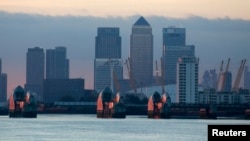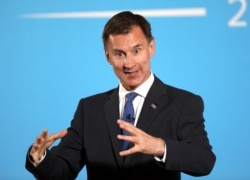Four centuries ago, the world’s first multinational company was established in Amsterdam. The Dutch East India Company was created by a government-directed merger of rival trading companies and went on to dominate the Asian spice trade.
The company’s formation was crucial in a series of major innovative steps that saw the capital of The Netherlands blossom into Europe’s financial capital. The Dutch thought their Golden Age would last forever — but it lasted just throughout the 17th century before larger powers, with bigger populations, notably Britain, modernized and came up with market-centered innovations of their own.
Could something similar happen to London, because of Brexit and the political turmoil and unpredictability it has brought? Fears are growing that it could. This week, Britain’s premier business magazine, The Economist, warned about Brexit risks to the city of London, arguing it may spell its end as “the capital of capital.”
Banks based in London are restarting their preparations for a so-called no-deal Brexit, which would involve Britain relinquishing membership of the European Union without any withdrawal agreement or any trading arrangements in place. There had been a lull in the shift of financial services jobs and capital from Britain to the EU in the recent months, according to EY, a consultancy that’s been tracking Brexit-related announcements by 222 of the largest financial services firms.
But now, with the odds mounting on a hard Brexit, the mood has changed.
“In the last few weeks, we have seen some firms restarting their programs and we expect preparation activity for a no-deal to increase markedly,” said Omar Ali, head of financial services for EY in Britain.
With its convenient time zone, light banking regulations and stock market deregulation ushered in by Margaret Thatcher in 1986, in what was dubbed the “Big Bang,” London has thrived. For the past quarter of a century, it has been the global financial powerhouse and highest net exporter of financial services anywhere in the world.
The city’s financial district, nicknamed the Square Mile, generates $152 billion of output a year, allocating capital and distributing risk across the globe. London accounts for a third of the world’s currency dealing and not far short of a quarter of all cross-border lending. From trading in derivatives and bonds, arranging interest swaps and raising funds as well as managing assets, London has been the go to city.
For the British economy, the financial sector has made all the difference to the country's prosperity and growth. More than 2 million jobs in Britain are tied to financial services.
The confidence of the city of London can be seen in its changing skyline, which has altered dramatically with the mushrooming of grandiose, dizzying skyscrapers, including the iconic high rise The Shard. A record 76 skyscrapers are on schedule to be finished in 2019 - more than any other year.
Brexiters point to the skyline, arguing international firms are still building and therefore retain their confidence in London remaining a major financial hub.
But with the mounting possibility that Britain will leave October 31 without a withdrawal agreement, a disorderly exit that would see financial ties to Europe unraveled, analysts are questioning whether London can remain the pumping heart of the international monetary system.
Bankers are already hedging their bets to be ready to bolt if London fails its toughest test yet. Nearly 300 major financial firms have shifted some staff and trading activity to other EU member states ready for possible major relocations depending on the manner of Britain’s break from the bloc. Around $1.3 trillion in capital has already been shifted.
A no-deal Brexit means the likely loss of so-called passporting rights of financial firms based in Britain, blocking them from doing business in the rest of the EU without gaining complicated authorization first from each member country, a lengthy and costly process full of legal minefields.
“The UK's departure from the European Union will have complicated, significant and long-term impacts on the financial services,” the top legal firm Clifford Chance has warned. Financial firms based in Britain have disclosed $5.2 billion in relocation costs, legal advice and contingency provisions so far.
Bank of America has spent more than $400 million moving some employees and operations to Dublin and Paris. Other banks have been using their existing EU entities to expand operations such as UBS in Frankfurt. Barclays and HSBC are set to become the biggest banks in Dublin because of the assets they have relocated there. Major U.S. investment banks have drafted contingency plans to transfer about $280 billion of balance sheet assets from London to Frankfurt.
Outgoing British Prime Minister Theresa May had hoped in the worst case scenario to pull off a free flowing transitional arrangement based on “regulatory equivalence,” whereby the European Commission is able to judge a country’s regulatory regime as a match for the EU’s and grant market access.
But neither rival Conservative candidates Boris Johnson nor current Foreign Secretary Jeremy Hunt, vying to replace her, has said much about the prospects for Britain’s financial services in the event they lead Britain out of the EU without an exit deal — a startling omission for the bankers and investment bosses, considering the government’s tax take from financial services amounts to more than $80 billion a year.
Even if they can pull off a temporary financial services deal based on equivalence, it has “two key weaknesses,” according to academic John Salter. Market access for trading would be limited to certain services and certain types of clients.
“First, it is not as extensive as passporting, and large parts of the financial services business, such as banking and deposit taking, or selling investment products to retail consumers are out of scope. Second, the European Commission can revoke its judgment of equivalence with only 30 days’ notice,” Salter noted in a recent study.
It isn’t clear that the EU has much interest in being accommodating by agreeing to long-term equivalency or negotiating a deal tailored for London-based banks and financial services. Amsterdam, Frankfurt, Paris, Milan, Madrid and Dublin are all jostling to grab as much as they can of London’s financial services. There is also mounting pressure on international banks and financial service firms which plan to use their EU-based entities post-Brexit to move their vast pools of assets from London, which hosts $20 trillion in bank assets and securities.
London generates a quarter of its income from the European continent. Brexiters say that loss could be made up by boosting non-EU business. That is easier said than done — if banks, investment houses and asset managers have to shift a large portion of their business to the EU, why not all of it to save staff and building costs?
London, as the capital of capital, “relies on stable politics and regulation, close ties to America and seamless ones to Europe,” The Economist editorialized this week. Brexit threatens the three-legged stool on which London sits.







